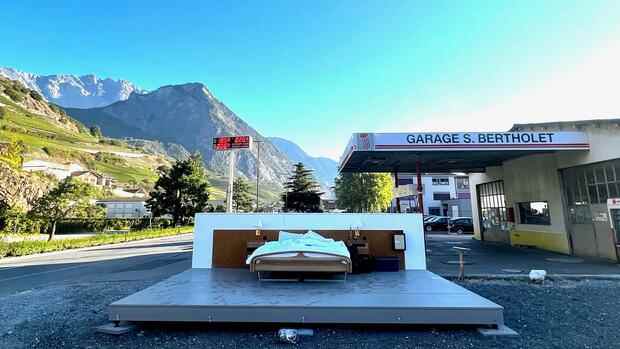Approaching the gas station on Avenue des Comtes de Savoie in the small commune of Saillon in the Swiss canton of Valais is a bit like stepping into Edward Hopper’s 1940 painting Gas: an illuminated gas station in the middle of nothing. A “non-place”, as the French anthropologist Marc Augé would have called it.
“Non-places” are monofunctionally used areas, wastelands of a technocratic civilization. Although people can use them to satisfy a specific need – refueling, shopping, leaving – they have no history and no identity. They stand for the loneliness and communicative neglect of Hopper’s “Night Hawks”.
In Saillon you have to take a closer look, then this place will turn from a “non-place” into something special. Because right next to the unmanned gas station there is a double bed on a pedestal, without a roof or walls, but lavishly furnished with fresh white pillows and sheets, with a glowing bedside lamp on both sides. There you can sleep unprotected in the open air. When it rains, it rains. When a stranger comes, he stands right next to the bed. If something happens in the bed, it’s public.
The “anti-idyllic zero-star suite” is part of an art project by the hotelier Daniel Charbonnier and the Swiss twin brothers Frank and Patrik Riklin. Since 2008 they have been setting up temporary “hotels” in unusual places. In the middle of a picturesque winery, for example, surrounded by nature.
Top jobs of the day
Find the best jobs now and
be notified by email.
The bed in Saillon, however, is different from anything that has gone before. You sleep there at the gas station – and that’s what it’s all about. “Sleep is not the most important thing,” says Frank Riklin. “It is important to think about the current world situation. Staying here is a statement of the urgent need for societal change.”
And so you lie in this bed at about five degrees and first of all ask yourself: Why am I doing this? It’s cold, it’s light, and the feeling of defenselessness creeps up on you, sleeping under the open sky on the edge of a street that is also used at night.
Frank and Patrik Riklin founded the hotel concept in 2008.
(Photo: Miriam Meckel)
At some point around four o’clock a white van pulls up, stops at the gas station, doors open and close again, after a while it drives off again. The whole thing is repeated several times. How many times can you have to fill up in a row? I can no longer think of sleep.
Whenever I open my eyes, I realize how bright it is in the middle of the night even on the outskirts of a small town – street lamps, car headlights, house lights. What is all this light for when the world is asleep? A waste that also robs me of my sleep.
Technologies become more noticeable at night
This night in Saillon can be seen and heard. Cars rush past, at the gas station there is a Selecta machine loudly spitting out chips and drinks. At two thirty in the morning a woman is walking with three barking dogs. And again and again these cars that race past the bed.
This night is like a brightly lit concert of life. The technologies that surround us every day become so much more perceptible at night – a hum of civilization. It never stops completely, but occasionally becomes noise and light pollution. An exercise in becoming aware of how we have denaturalized our world.
How we forgot to ask when you really need which technologies and when you could be economical. In which you realize what a luxury it is to sleep in peace and warm with a roof over your head in your own four walls. We install expensive blinds in them to regain the natural darkness that one needs to sleep, but which we light out 24/7 in the cities.
“It’s about the realities we’re all facing today,” says Daniel Charbonnier. And indeed: you get to know them in a completely different way at night at the gas station.
Conflicting goals between privacy and security cannot be solved by technology
Are there never any problems with the guests? “There’s an interaction between those sleeping in the outdoor bed and the environment,” says Charbonnier. Two young women fled from their beds to a nearby hotel, fed up with confronting the excesses of civilization.
“We can’t put cameras everywhere here either,” says Charbonnier. “The bed is an intimate place, do I want to be filmed there around the clock?” The conflict of goals between privacy and security cannot be solved by technology, only by civilization.
With all the unusual things that can cause a sleepless night, there is one constant. This is the butler Lotti. The 65-year-old retired citizen of Saillon is committed to the well-being of her guests.
In the evening she serves a local red wine, in the morning tea with pastries. She embodies the essence of the whole project: “Zero stars: you are the only star.” And shows what one can occasionally forget these days: It is not technological progress that makes a non-place worth living in, but the people you meet.
In this column, Miriam Meckel writes fortnightly about ideas, innovations and interpretations that make progress and a better life possible. Because what the caterpillar calls the end of the world, the rest of the world calls a butterfly. ada-magazin.com
More: End the paternalism of the tech companies – “Right to Repair” movement puts property rights back in order
